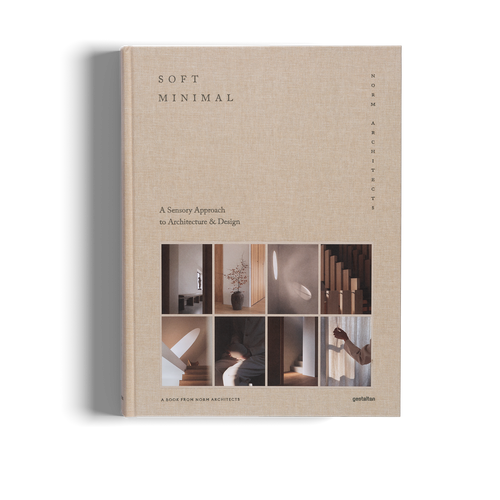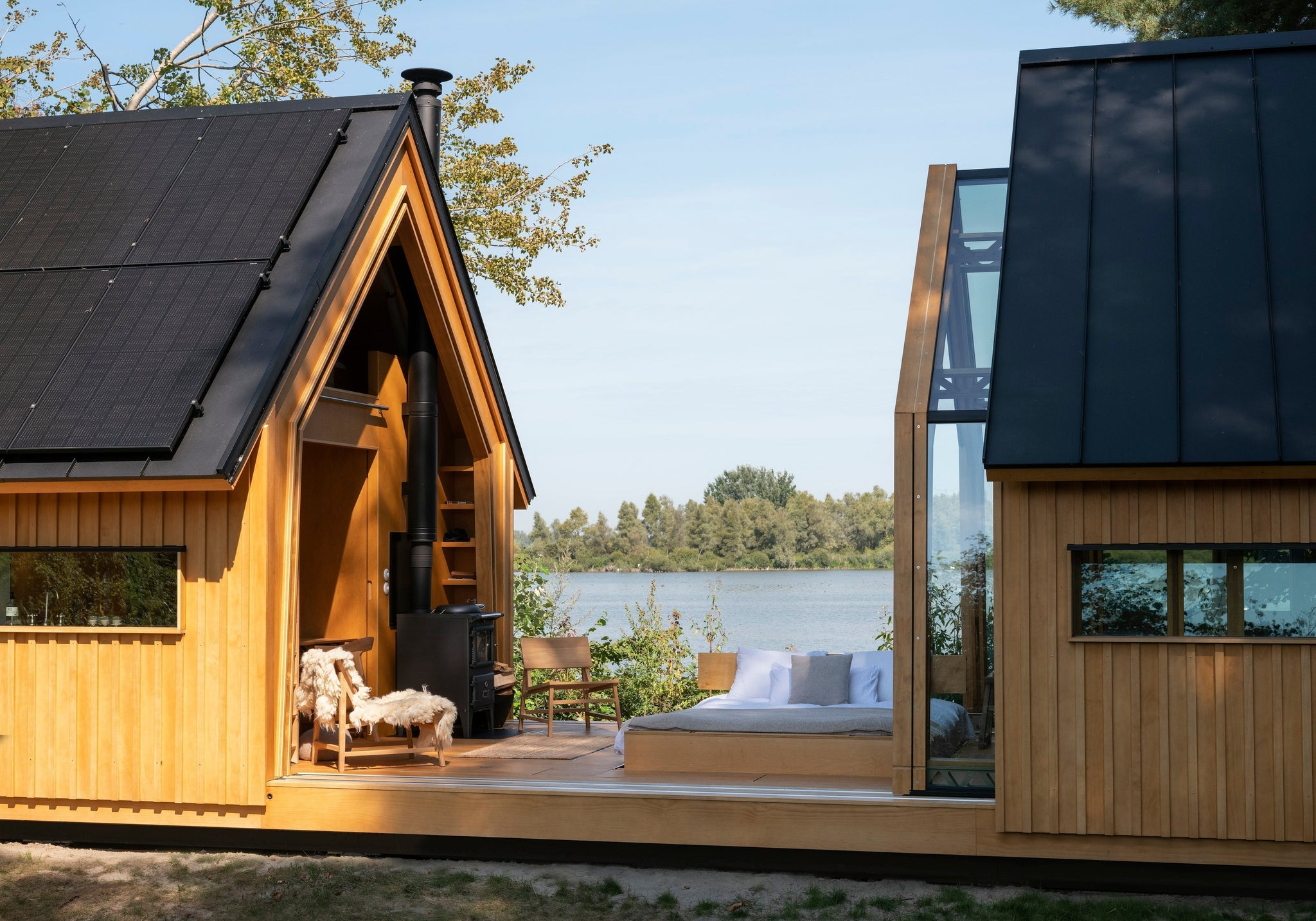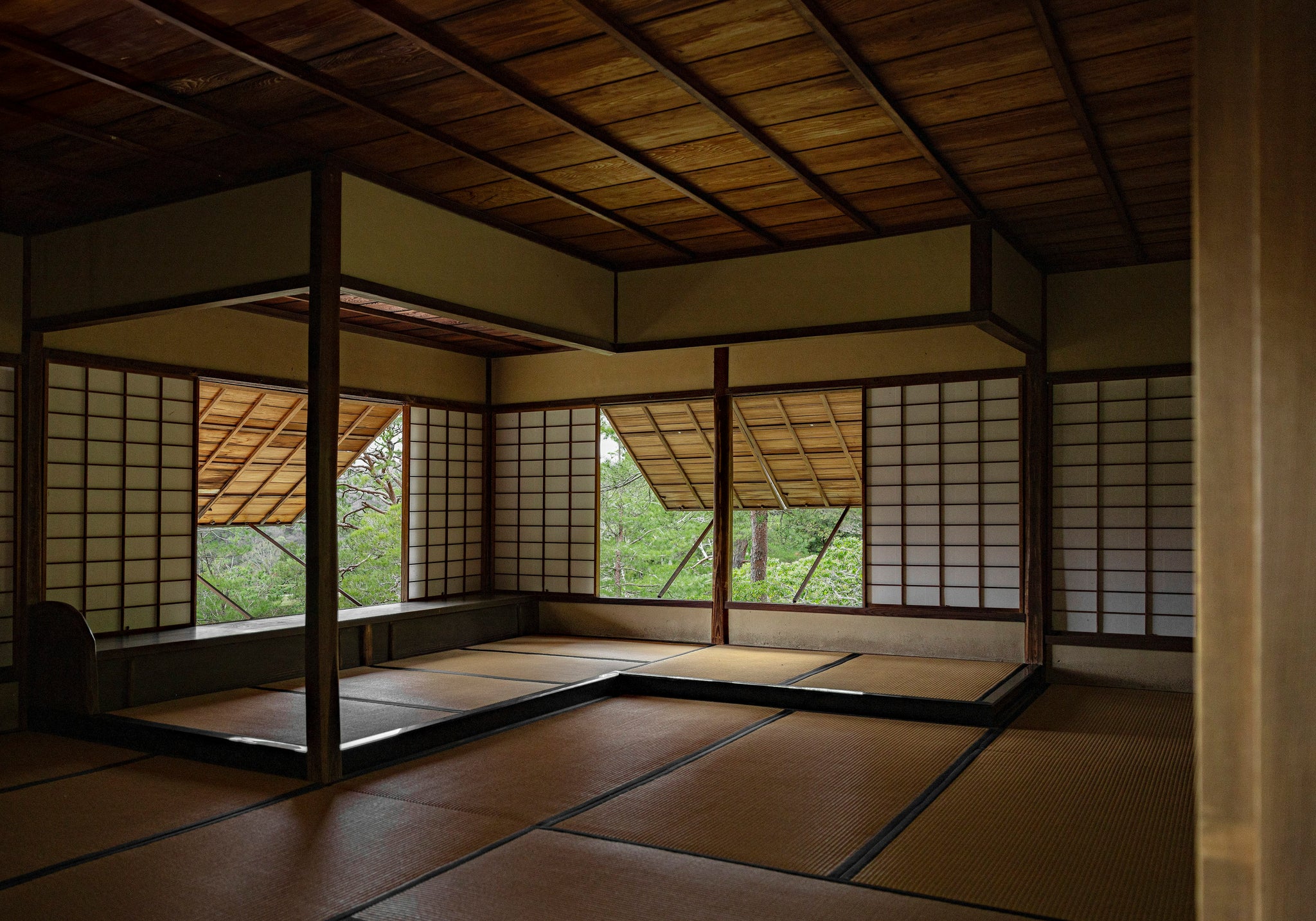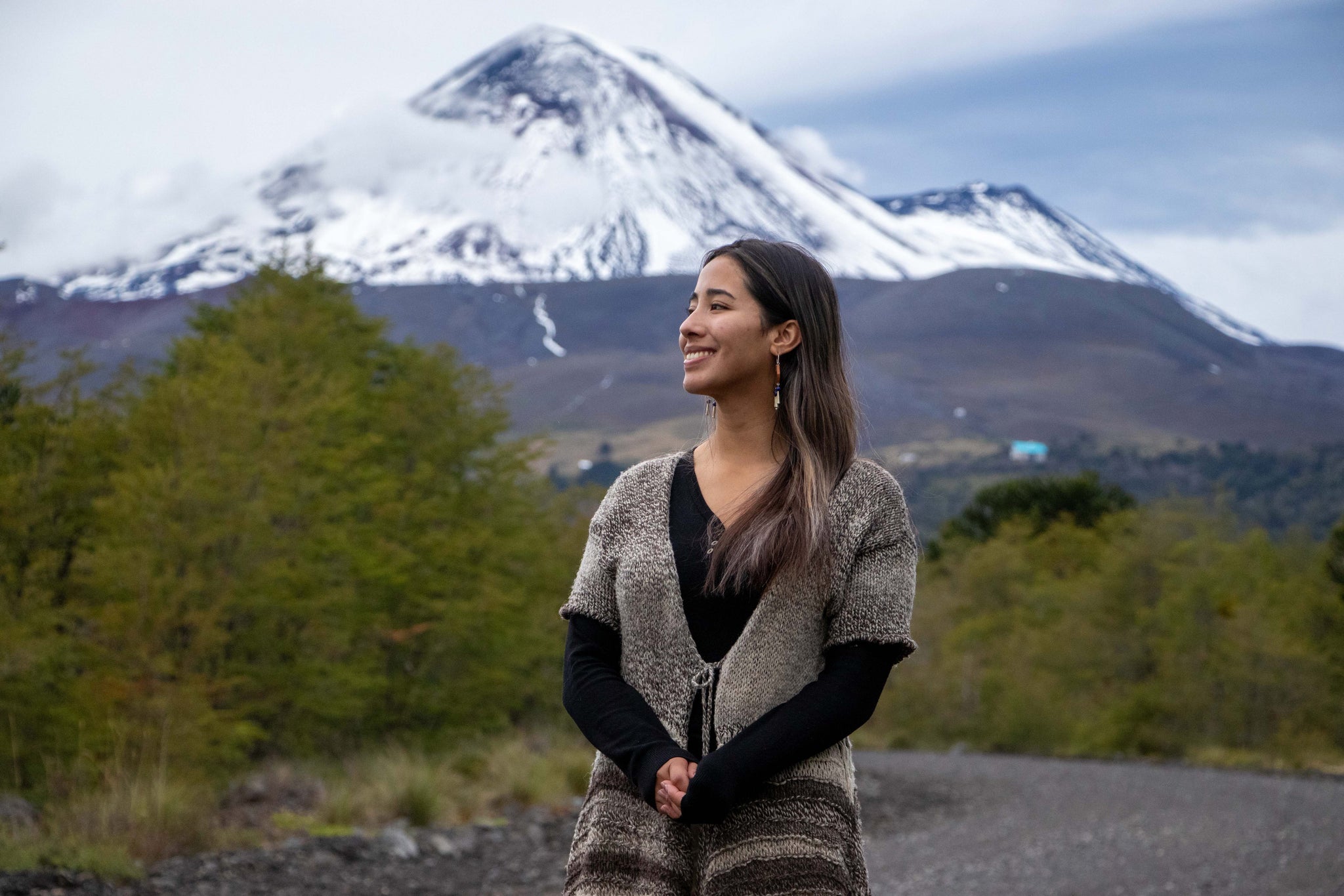
06/2021 design & fashion
Kyle Hoff lives with his wife Brooke and baby daughter Henni in a single-story cuboid home in Detroit’s Lafayette Park, the largest collection of residential homes designed by the great modernist architect Mies van der Rohe. The compact but light-flooded space is dotted with classic designs that coexist happily with a walnut platform bed and an L-shaped sofa in Ocean Dive blue from Floyd, the furniture brand that Hoff founded in 2014 with Alex O’Dell.
"I like design that is functional and timeless, but not elitist," says Hoff. "An Eames chair fits in just as well in a Chicago elementary school as in a modernist house in the Hollywood Hills. It just works, which is what good design should do," he exclaims. Many of the ideas behind Floyd began with a Malm bed from IKEA back in 2011. He had a new job as an architectural designer at a Chicago firm and wanted to rebuild the well-traveled bed that he’d first bought during his master’s degree at the University of Michigan. "It was rhombus-shaped and rickety by this point,’ says Hoff. "I remember pondering yet another schlep to an IKEA in the suburbs and thinking: there has got to be a better way."
He had stumbled upon a real pain point, not just for consumers having to make repeated trips to buy the same fiddly IKEA products each time the products wore out or the people moved house (the average American moves 11.4 times in a lifetime), but also for the environment, given that more than 9 million tonnes of furniture end up in US landfills each year. He found an opportunity for a business to exist in the gap between IKEA’s well-designed but disposable furniture and top-end brands that were complicated to deliver and that came with significant markups. "We wanted to create affordable, quality furniture for everyone. Both designs and products that are built to last," Hoff says.

According to the EPA, more than 9 million tons of furniture end up in landfills each year. Founded in 2013 in Detroit, co-founders Kyle Hoff and Alex O’Dell launched on Kickstarter with a single product, The Floyd Leg. (Photo: Floyd, Work Better. Live Smarter. Be Happier.)
In early 2012, he found himself in a local coffee shop sketching out his first big idea: a set of adjustable steel table legs that could turn any flat surface into a table or a desk, allowing for smart upcycling and multiple reuses. After being rejected by close to 20 manufacturers, he found a small-scale producer in Columbus, Ohio, who made him a prototype for $500. He couldn’t yet call it perfect, but it worked.
But it wasn’t until he moved to Detroit to work as a designer and project manager for a startup incubator called Practice Space that he met Alex, who was launching the brand for it. His future business partner had traveled widely–from making films in Georgia and Armenia to launching a telehealth startup in Mumbai–and was all too familiar with buying and throwing away IKEA products. "We had this instant connection around an experience that so many people have had, but also around the design we loved," says Hoff.
With a first product made of steel, the pair were inspired by their childhoods in Youngstown, Ohio, a city once defined by its steel industry. The company was named after Hoff’s father, grandfather, and great-grandfather, all Ohio steelworkers named Floyd (helpfully, the table legs were shaped like an F, too). Together, they launched their first Kickstarter campaign in 2014, initially aiming to sell 100 sets of Floyd's legs. They ended up generating more than a quarter of a million dollars and selling close to 1,500.

The Floyd HQ was once the home of a factory making spiral cutters for food. Though it had been vacant for 20 years, and much of the block remains so, the Eastern Market is still an important food production hub, and the massive farmer’s market that started in 1841 still runs every Saturday. (Photo: Elaine Cromie, Work Better. Live Smarter. Be Happier.)
Early on, they processed orders and worked on designs in a garage in Detroit’s Corktown district, having taken out a ‘terrifying’ personal loan of more than $300,000. Their first investor–who subjected the pair to an intensive interrogation–was Airbnb co-founder Joe Gebbia, who had hopped on the Floyd bandwagon with the Kickstarter campaign, and who has since filled Airbnbs from Montauk to Mount Hood with Floyd furniture as part of a collaborative program called Stay Floyd. Other investors have included Michigan-based furniture giants La-Z-Boy and venture capital firms like 14W and Brand Foundry, which have funded Goop, Everlane, Allbirds, and The Wing, respectively.
But their mission was to change the way we buy and keep furniture, not just to sell table legs. What Hoff calls the ‘hail Mary moment’ came in 2016 with The Bed (Floyd’s product names are as unfussy as the items themselves), which consists of a low platform that arrives in three simple parts, and can be matched with a headboard and under-bed storage. The brand’s first foray into ‘going after the whole home’ was accompanied by the advertising choice to fund billboards close to IKEA branches around Portland and the Bay Area that read: "Buy their meatballs. Buy our bed frame."
Today, Floyd’s product range has remained simple and concise. The brand’s pared-back but pleasing designs include The Shelf and The Sofa, each modular and customizable so that customers have the option to choose an L-shaped or two-seater sofa or to choose between 13 different shelving configurations, with add-ons like a cabinet or media console. Everything is delivered flat-packed and without shipping costs, with easily replaceable parts.

Kyle’s father-in-law is obsessive about growing dahlias. Hooked on the color and the texture of the flowers, which he and Brooke often display in the house, Kyle is carrying on the family tradition. (Photo: Elaine Cromie, Work Better. Live Smarter. Be Happier.)
The business has grown more than 100% each year, but Hoff says that building a successful business never comes easy. "People starting (out) have to be patient. There’s been this idea that you raise money on a big idea and sell in two years, which is just not how amazing businesses are built. You can easily be distracted by glamorous startups with big ideas, but constantly looking at what everyone else is doing can lead to groupthink. A lot of these ideas won’t be cool in a decade, but we want our products to last 50 years. You have to really know who you are as a brand and what you’re about, and to keep a disciplined focus on that."
Today, Floyd has grown out of the Corktown garage to employ more than 40 people in a factory space–which once made spiral cutters for ham–in Detroit’s Eastern Market, the biggest historic market in the US and a buzzing symbol of Detroit’s recent resurgence. Visitors can lounge on beds and sofas in the airily whitewashed Floyd shop, whose aesthetic is echoed on Floyd’s Instagram feed and Lived In, the brand’s addictive interior design blog.
This subtly aspirational branding is masterminded by their primary domain is the research and development facility at Eastern Market, where he’s looking at expanding into seating, outdoor furniture, and lighting. Little Henni has got him thinking, too, about children’s items, such as adaptable cribs and changing tables.

Product development is critical to the success of Floyd. Founder Kyle sketched out his first big idea in a coffee shop way back in 2012. Over the next couple of years, he faced multiple rejections while he continued to work on the prototype which, initially, wasn’t perfect but worked. (Photo: Elaine Cromie, Work Better. Live Smarter. Be Happier.)
As the product range grows, Hoff always comes back to Floyd’s mission statement–so much so that he has a member of the team read it at the start of every Monday-morning meeting. Beyond his aim to cut down the amount of furniture that goes to landfills, he is very proud to manufacture products in the US. With a US-based supply chain and distribution hubs in major cities, having an item in stock is never a concern–a big competitive advantage when many of the big players in the furniture manufacturing industry struggle with stock availability. But another reason that he keeps manufacturing in the US, and mostly in the Great Lakes region, specifically, is because the area has nurtured many of his design heroes. The likes of Eero Saarinen, Charles, and Ray Eames, and Florence Knoll studied at the Cranbrook Academy of Art, just a half-hour drive to the north of Floyd’s Detroit HQ, and he cites legacy furniture company and fellow Michigan brand Herman Miller as an inspiration due to its focus on an enduring design.
"There are architecture snobs, of course, but also people of all kinds of backgrounds, many of whom have been here since the fifties." He describes his home as a ‘refuge and oasis,’ especially during a lockdown, when Floyd performed better than expected, helped by its existing model and supply chain designed for fast, simple online ordering. "Living in a good space is part of your wellbeing, like eating well or keeping fit," he says. "That idea feels more important than ever."
Explore creative entrepreneurship through Work Better. Live Smarter. Be Happier.













